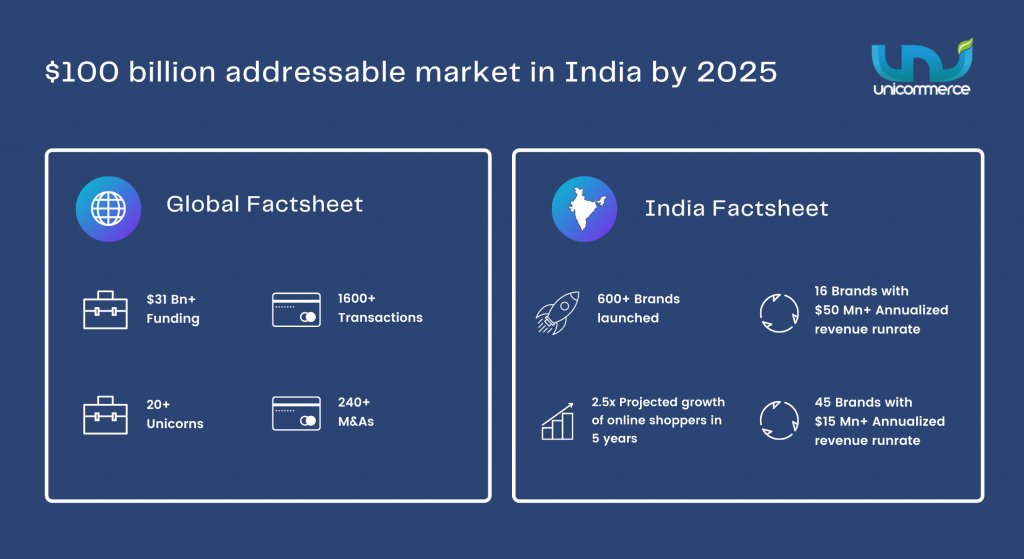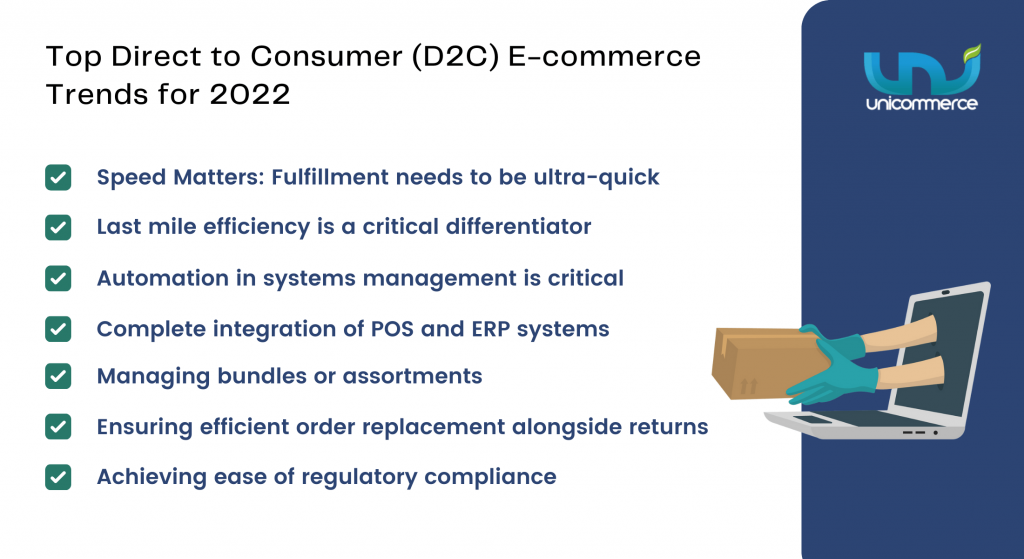Over the last two years, the world in which we operate has mutated quite dramatically. One clear example is the rapid rise of Direct to Consumer e-commerce within the larger and fast-expanding world of online business.
Let’s look at the top trends that will empower D2C e-commerce brands and drive success in 2022.
Top 7 D2C E-Commerce Trends to Look for in 2022 are –
1. Speed Matters: Fulfillment needs to be ultra-quick
This year your company can soar ahead of other D2C brands by delivering ‘instant gratification to your customers. The secret to success lies in reducing fulfillment time while maintaining high levels of efficiency. If your company can ensure minimal time lags between the ‘product selection’ and ‘ready for dispatch’ stages, it is more than likely you will become a roaring success.
2. Last mile efficiency is a critical differentiator
Your D2C brand can gain popularity by being the ‘fastest finger’ operator and delivering quicker than the competition. This can be achieved by combining high-quality inventory management with hyperlocal delivery systems. Develop a well-planned network of carefully dispersed fulfillment locations (warehouses) that focuses on smaller, more concentrated geographies. Also, fortify mechanisms to manage them smoothly and seamlessly. Use warehouse management software to make sure stocks are neither short nor surplus. The key is to balance 100% coverage without unnecessary stock overlaps.
3. Automation in systems management is critical
Automation is clearly the best way for an emerging or well-established D2C e-commerce company to surge ahead. It will enable your brand to reach your target audience directly without the need for intermediaries or middlemen. All you need to do is choose an appropriate e-commerce back-end automation solution for a particular operation as per your needs. It could be warehouse management, inventory management, multichannel order management, shelf management and batching, inventory ledgers, payment reconciliation, report schedulers, etc. Alternatively, you could opt for a full-stack D2C e-commerce platform.
4. Complete integration of POS and ERP systems
Another critical ingredient in D2C operations that can be enabled by automation is the proper integration of POS and ERP systems. Syncing the consumer-facing front end of the business with back-end operations can streamline processes and enhance efficiency. Moreover, seamless e-commerce integration across multiple functions will give you access to a wealth of data. This can be analyzed and mined to improve efficiency and profitability and aid in business forecasting.
5. Managing bundles or assortments
A popular offering that boosts customer satisfaction is ‘curated combos’ or ‘mixed assortments’ of merchandise. These allow you to offer additional discounts and enhance the total value of each transaction.
Creating such ‘deals’ sounds simple. However, to really make them work, you will need software that can automate the entire process management. Each assortment needs a unique SKU on the sale and delivery side. However, inventory management should occur at the individual product level and immediately reflect stock availability. A truly all-round D2C focused e-commerce platform can provide such solutions.
6. Ensuring efficient order replacement alongside returns
A growing number of consumers opt for replacement/exchange instead of returns. You can score ‘brownie points’ if your brand can manage the logistics of this process seamlessly. Develop systems for simultaneous exchange and pick up, rather than having a time lag between the two.
This can be managed by an AI-driven tech system running on a D2C focused e-commerce platform that pairs the pick-up and replacement processes and assigns them to a single logistics partner.
Read how Businesses are growing with Unicommerce – How Honasa Consumer, the parent company of Mamaearth, attained a 99.99%+ Order Fulfillment rate for its D2C operations?
7. Achieving ease of regulatory compliance
With an increase in regulatory oversight of the e-commerce and logistics industry, the need for compliance has increased. Integrate features like gate passes and e-way bills into the system so that these are generated smoothly as part of a single transaction without becoming ‘pain points’ in operations.
Overall benefits
Each of the above may seem like a small add-on for a D2C e-commerce brand, but the cumulative effect of automating each process over a large number of deliveries can be surprisingly significant! Remember, this is the only way to stay ahead of the market and emerge a winner.
Schedule a FREE demo with Unicommerce D2C consultants.
Related Read:



